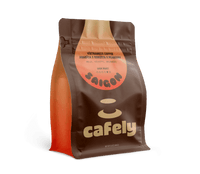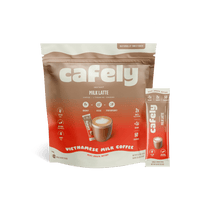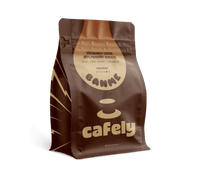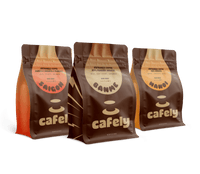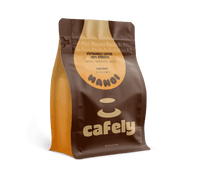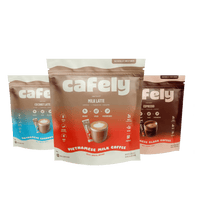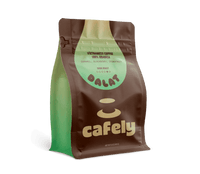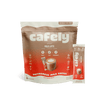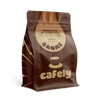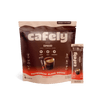Many of us can't imagine starting our day without a cup of coffee, but timing makes a huge difference if you want sustained, all-day energy without the crash.
This article explores the best times to drink coffee to maximize its benefits without disrupting your sleep cycle.
When Is the Best Time to Drink Your First Cup of Coffee?

Coffee can be beneficial in the morning, but avoid drinking it right after waking [1].
Over the first hour after waking up, our bodies undergo a 'cortisol awakening response' [2]. During this time, a compound called adenosine is being cleared from the neurons. This compound binds to our brain cells and causes us to feel sleepy.
Caffeine in coffee works by forcefully removing adenosine from our neurons. This effectively "reverses sleepiness" — but only temporarily. If you drink coffee too early in the morning, this adenosine isn't properly cleared. Caffeine removes it but doesn't eliminate it. Once the effects of caffeine wear off 4–6 hours later, this adenosine comes right back — causing that loathsome mid-afternoon crash.
Caffeine also increases cortisol levels by stimulating the pituitary gland [3]. If we drink too early in the morning when cortisol is still peaking, we can become agitated and anxious.
The ideal time to drink coffee is about 90 minutes after you’ve woken up — when adenosine levels have been cleared and cortisol begins to dip [4].
Is It Okay to Drink Coffee In the Evening?

Waiting 90 minutes in the morning can be torture for some, but what about drinking coffee in the evening?
Studies show regular coffee consumption can decrease sleep time and quality due to melatonin production disruption, which affects sleep [5,6]. Even the caffeine from one cup of coffee can delay the circadian rhythm in humans [7,8]. This disruption leads to poor sleep.
Don’t panic, there’s no reason to stop drinking coffee throughout the day. Finish your last cup 6 hours before hitting the pillow and you're good to go.
How Much Coffee is Too Much?

The FDA recommends staying below 400 mg of caffeine per day (that’s around 4 cups of coffee on average). This amount is safe for most people, but focusing on your body's reaction is best. Some people are more sensitive to caffeine than others and take longer to break it down. Thinking about when to drink coffee after waking up and throughout the day is important. It’s also wise to consider how much coffee you can handle.
Caffeine tolerance can vary, so track how you feel when drinking coffee. If you have heart issues or anxiety, think about lowering your caffeine consumption. Decaf coffee, made by removing caffeine with water or natural solvents, is a delicious low-caffeine alternative with familiar flavors.
Pregnant women should take caution when consuming coffee. The general consensus suggests consuming up to 200 mg of caffeine daily is safe for pregnant women. Recent studies lean towards a maximum of 100 mg of daily caffeine intake during pregnancy [9].
Optimizing Coffee Intake for Athletic Performance

Take caffeine 60 minutes before exercise to see the best results. Caffeine improves exercise performance in doses of 3-6 mg/kg body mass. A pre-workout coffee boosts performance and betters attention, vigilance, and reaction time, as shown through exercise performance in the table below [10]:
|
Author |
Population |
Caffeine |
Results |
|
Kamimori et al. (2002) |
84 healthy males |
|
100 and 200 mg of caffeine gum and capsules equals comparable caffeine amounts to the systemic circulation |
|
Ryan et al. (2012) |
8 college-aged, physically active males |
|
Maintenance of time to exhaustion in cycling |
|
Ryan et al. (2013) |
8 well-trained male cyclists |
|
Improved cycling time trial performance with 300 mg caffeine gum administered 5 min pre-time trial |
|
Lane et al. (2014) |
12 well-trained males, 12 well-trained females |
|
Improved cycling time trial performance by 3-4% |
|
Oberlin-Brown et al. (2016) |
11 well-trained male cyclists |
|
Maintenance of cycling time trial |
|
Paton et al. (2015) |
10 well-trained male and 10 well-trained female cyclists |
|
3-4 mg/kg enhanced endurance (>5 min) and sprint power output (<30s) by similar amounts (~ 4%) during the final 10km of a 30-km race |
|
Paton et al. (2010) |
9 competitive male cyclists |
|
Power output decline in 3rd and 4th sprints |
|
Bellar et al. (2012) |
9 collegiate shot put athletes |
|
Improved shot put performance |
|
Ranchordas et al. (2018) |
10 collegiate male soccer players |
|
Improved Yo-Yo Intermittent Recovery Test level 1 and countermovement jump |
|
Venier et al. (2019) |
19 resistance-trained men |
|
Improved performance in jumping height, isokinetic strength and power, movement velocity in the bench press, and whole-body power output |
Source: International Society of Sports Nutrition Position Stand: Caffeine and Exercise Performance
This data indicates improved performance post-caffeine consumption across various sports and exercises. Alongside improved activity, better focus is also a huge benefit of drinking coffee. As we talked about earlier, caffeine can affect our circadian rhythm, and caffeine withdrawal can trigger symptoms when intake is stopped abruptly.
FAQs: When to Drink Coffee
Do you still have questions about what is the best time to drink coffee? Let’s answer some popular questions next.
1. What is the best time to drink coffee to wake up?
At least 90 minutes after initially waking up is the best time to drink coffee. This timing aligns with the body’s natural cortisol dip, preventing an unnecessary cortisol increase.
2. How does caffeine affect sleep?
Caffeine affects sleep by disrupting circadian rhythm, delaying sleep onset, and lowering sleep quality. Negative effects like these are seen when consuming coffee too close to bedtime.
3. Is it bad to drink coffee on an empty stomach?
Drinking coffee on an empty stomach can affect people in different ways. Some may have gastrointestinal problems like stomach pain, but this doesn’t happen to everybody. Coffee is sometimes linked with gut problems, but studies produce contradicting results [12]. Enjoy your morning coffee alongside breakfast, and eat snacks with coffee to help stop unpleasant symptoms.
4. Can I drink coffee late in the day?
Drinking coffee late in the day is best done at least 6 hours before bed. Leaving ample time between your final coffee and bedtime means caffeine is less likely to disrupt your sleep.
Related: How to Stay Awake Without Caffeine
5. How much coffee can I drink daily?
Up to 400 mg of daily caffeine consumption is deemed safe by the FDA. Personal tolerance can vary, so it’s important to listen to your body.
6. Does the type of coffee affect when it should be consumed?
Different blends and coffee roasts contain varying levels of caffeine and flavors. Robusta beans are stronger than arabica [13], so enjoying a cup of robusta is ideal in the morning to boost energy and prepare you for the day ahead.
Related: What’s the Difference Between Robusta & Arabica Coffee?
References
- Smith, A. P., Rusted, J. M., Savory, M., Eaton-Williams, P., & Hall, S. R. (1991). The effects of caffeine, impulsivity, and time of day on performance, mood, and cardiovascular function. Journal of Psychopharmacology, 5(2), 120-128.
- A. Steptoe, B. Serwinski. (2016). Chapter 34 - Cortisol Awakening Response. Pages 277-283.
- Lovallo, W. R., Whitsett, T. L., Sung, B. H., Vincent, A. S., & Wilson, M. F. (2005). Caffeine Stimulation of Cortisol Secretion Across the Waking Hours in Relation to Caffeine Intake Levels. Psychosomatic Medicine, 67(5), 734.
- Bowles, N. P., Thosar, S. S., Butler, M. P., Clemons, N. A., Robinson, L. D., Ordaz, O. H., Herzig, M. X., McHill, A. W., M. Rice, S. P., Emens, J., & Shea, S. A. (2022). The circadian system modulates the cortisol awakening response in humans. Frontiers in Neuroscience, 16.
- Drake, C., Roehrs, T., Shambroom, J., & Roth, T. (2013) Caffeine Effects on Sleep Taken 0, 3, or 6 Hours before Going to Bed. Journal of Clinical Sleep Medicine: JCSM: Official Publication of the American Academy of Sleep Medicine, 9(11), 1195-1200.
- Shilo, L., Sabbah, H., Hadari, R., Kovatz, S., Weinberg, U., Dolev, S., Dagan, Y., & Shenkman, L. (2002). The effects of coffee consumption on sleep and melatonin secretion. Sleep medicine, 3(3), 271–273.
- Burke, T. M., Markwald, R. R., McHill, A. W., Chinoy, E. D., Snider, J. A., Bessman, S. C., Jung, C. M., O'Neill, J. S., & Wright, K. P., Jr (2015). Effects of caffeine on the human circadian clock in vivo and in vitro. Science translational medicine, 7(305), 305ra146.
- Zhang, Y., Yang, W., Xue, Y., Hou, D., Chen, S., Xu, Z., ... & Liu, C. (2024). Timing Matters: Time of Day Impacts the Ergogenic Effects of Caffeine—A Narrative Review. Nutrients, 16(10), 1421.
- Román-Gálvez, M. R., Martín-Peláez, S., Hernández-Martínez, L., Cano-Ibáñez, N., Olmedo-Requena, R., Martínez-Galiano, J. M., Bueno-Cavanillas, A., & Amezcua-Prieto, C. (2022). Caffeine Intake throughout Pregnancy, and Factors Associated with Non-Compliance with Recommendations: A Cohort Study. Nutrients, 14(24), 5384.
- Guest, N. S., VanDusseldorp, T. A., Nelson, M. T., Grgic, J., Schoenfeld, B. J., Jenkins, N. D. M., Arent, S. M., Antonio, J., Stout, J. R., Trexler, E. T., Smith-Ryan, A. E., Goldstein, E. R., Kalman, D. S., & Campbell, B. I. (2021). International Society of Sports Nutrition position: caffeine and exercise Performance. Journal of the International Society of Sports Nutrition, 18(1), 1.
- Schwarzmann, E.T.; Washington, M.P.; Rao, N.Z. (2022). Physicochemical Analysis of Cold Brew and Hot Brew Peaberry Coffee. Processes 2022, 10, 1989.
- Syamimi, Wan & Zaman, Wan & Loh, Supeng & Me, Norhaizan & Loh, Su & Peng,. (2019). Coffee and Gastrointestinal Health: A Review. Malaysian Journal of Medicine and Health Sciences. 15. 96-103.
- Shokouh, P., Jeppesen, P. B., Christiansen, C. B., Mellbye, F. B., Hermansen, K., & Gregersen, S. (2019). Efficacy of Arabica Versus Robusta Coffee in Improving Weight, Insulin Resistance, and Liver Steatosis in a Rat Model of Type-2 Diabetes. Nutrients, 11(9), 2074.
